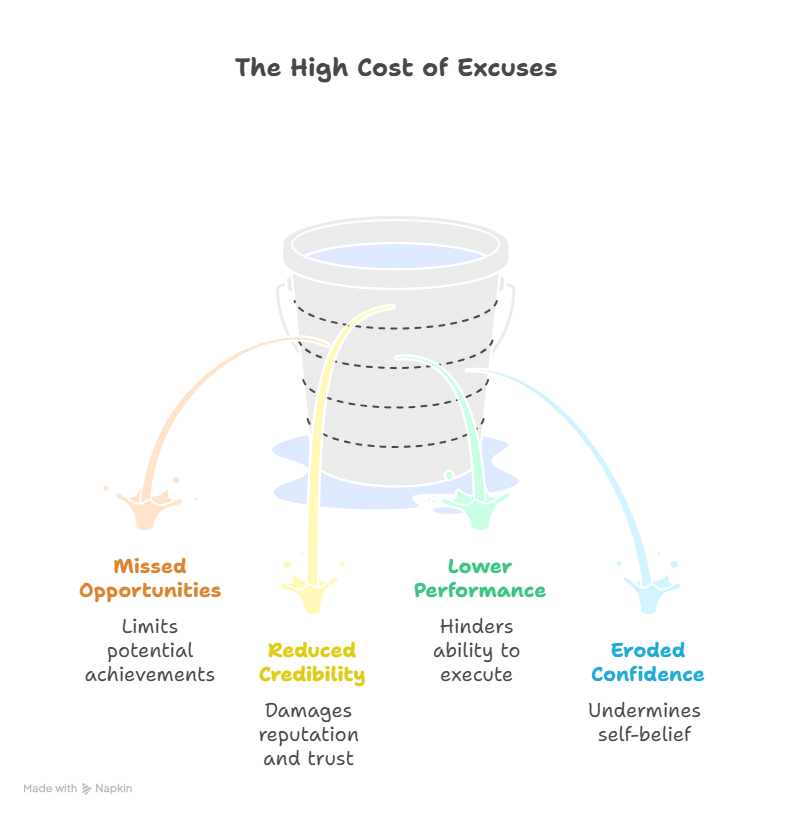Excuses are often the hidden barriers between potential and performance. Whether in personal development or professional growth, relying on excuses limits achievement, blocks innovation, and erodes accountability. In a competitive world, embracing excellence and focusing on actionable steps is critical for achieving results.
This article explores strategies to overcome excuses, cultivate discipline, embrace excellence, and consistently achieve desired outcomes.
Why People Make Excuses
Understanding why excuses occur is the first step toward eliminating them:
- Fear of failure: Avoiding risk by rationalizing inaction.
- Lack of clarity: Unclear goals or priorities create indecision.
- Overwhelm: Feeling unable to handle challenges can lead to justifying inaction.
- External Blame: Attributing setbacks to circumstances, other people, or luck.
- Comfort Zone: Avoiding discomfort that comes with growth or change.
The Cost of Making Excuses
Excuses might feel protective in the short term, but long-term consequences include:
- Stunted personal growth: Limited learning and skill development.
- Missed opportunities: Failure to seize new challenges and responsibilities.
- Reduced credibility: Colleagues and leaders may perceive a lack of accountability.
- Lower performance: Excuses prevent consistent results and excellence.
- Eroded confidence: Over time, reliance on excuses weakens self-belief.

Key Strategies to Stop Making Excuses
- Take Full Responsibility
Accountability is the cornerstone of success. When you own your actions, decisions, and outcomes, you move from a passive mindset to a proactive one. Excuses shift blame outward; accountability brings focus inward, where true change happens.
Actionable Tip: Start each day by asking yourself, “What can I control and improve today?” This daily reflection shifts your mindset toward solutions and keeps you in the driver’s seat of your performance.
- Set Clear Goals and Priorities
Excuses often arise from vagueness or lack of direction. If goals are unclear, it’s easy to justify inaction or delay. Instead, define SMART goals—specific, measurable, achievable, relevant, and time-bound. Clear goals sharpen focus, eliminate confusion, and provide a framework for accountability.
Example: If you have a large project, break it into smaller milestones. Weekly or daily targets help track progress and reduce the urge to procrastinate.
- Focus on Solutions, Not Problems
Excuse-making thrives in problem-centered thinking. Shifting from “Why this won’t work” to “How can I make this work?” opens doors to possibilities. Solutions-oriented thinking fuels creativity, resilience, and forward momentum.
Actionable Tip: For every obstacle, challenge yourself to come up with at least two actionable solutions before moving forward. This prevents stagnation and trains your brain to innovate under pressure.
- Cultivate Discipline and Consistency
Excuses often sneak in when motivation dips. But excellence doesn’t come from bursts of inspiration—it comes from discipline and consistency. Even small, repeated actions build habits that sustain long-term success.
Actionable Tip: Build a daily routine with accountability systems—like checklists, habit trackers, or accountability partners. Over time, consistency becomes your shield against excuses.
- Learn from Failures
Excuses often hide fear—the fear of failing, of being judged, or of not measuring up. But failure is not the enemy. It is a teacher. Every setback reveals lessons that can fuel better strategies and smarter performance.
Example: Instead of saying, “It didn’t work, so I stopped,” analyze what went wrong. Did you lack preparation? Was the timeline unrealistic? Adjust your approach and apply the lessons to the next challenge. Failure is only permanent if you stop trying.
- Surround Yourself with Excellence
Peer influence is powerful. If you surround yourself with people who constantly make excuses, you’re likely to adopt the same behavior. On the other hand, being around high-performing, accountable individuals raises your own standards and pushes you to improve.
Impact: A strong circle of excellence encourages self-improvement, fuels motivation, and fosters a culture of results. Choose to spend time with people who challenge complacency and model ownership.
- Leverage Tools and Resources
Many excuses come from feeling unprepared or under-equipped. Instead of giving in, look for tools, training, and resources to bridge skill gaps. Continuous learning is the antidote to feeling stuck.
Example: Corporate training programs like those offered by Ebullient help employees develop new skills, adopt best practices, and stay competitive. Whether it’s leadership, time management, or team performance, investing in the right resources eliminates excuses and builds confidence.
Benefits of Embracing Excellence
- Enhanced Productivity: Focused effort produces tangible results.
- Improved Reputation: Accountability builds credibility with peers and leaders.
- Personal Growth: Facing challenges head-on develops resilience and skills.
- Greater Opportunities: Consistent high performance attracts promotions and responsibilities.
- Confidence and Self-Belief: Overcoming excuses strengthens trust in one’s abilities.
Common Challenges
- Fear of Failure: Risk-aversion can trigger rationalizations.
- Procrastination: Delaying tasks often leads to excuses.
- External Pressure: Workplace dynamics may make taking responsibility challenging.
- Habits of Complacency: Long-standing patterns of avoiding accountability.
- Perceived Lack of Resources: Feeling unprepared can justify inaction.
Tips to Overcome Challenges
Break Big Goals into Smaller Tasks: Reduces overwhelm and increases momentum.
Track Progress: Visual reminders of achievements minimize excuses.
Seek Feedback: Constructive input identifies blind spots and improvement areas.
Celebrate Wins: Recognizing small victories reinforces accountability and motivation.
Commit Publicly: Sharing goals with colleagues or mentors increases accountability.
Final Words
Excuses are the barriers that separate potential from achievement. By taking responsibility, cultivating discipline, and embracing a results-driven mindset, individuals and organizations can consistently achieve excellence.
At Ebullient, we empower professionals and teams through tailored training programs, leadership workshops, and actionable learning experiences designed to eliminate excuses and drive tangible results. Our programs help employees develop accountability, skills, and strategies to deliver exceptional outcomes.
Unlock your team’s full potential and embrace excellence today by exploring our training solutions at ebullient Together, let’s move from excuses to results.
FAQ – Overcoming Excuses and Embracing Excellence
- Why do people make excuses at work?
Excuses often stem from fear of failure, unclear goals, overwhelm, or comfort zone limitations. - How can I stop making excuses?
Take responsibility, set clear goals, focus on solutions, develop discipline, and learn from failures. - Can accountability improve team performance?
Yes, fostering a culture of accountability increases engagement, productivity, and results. - How do I stay motivated when facing obstacles?
Break tasks into manageable steps, track progress, celebrate wins, and seek peer support. - How can training programs help reduce excuses?
Structured training equips employees with skills, confidence, and actionable strategies to tackle challenges effectively.



